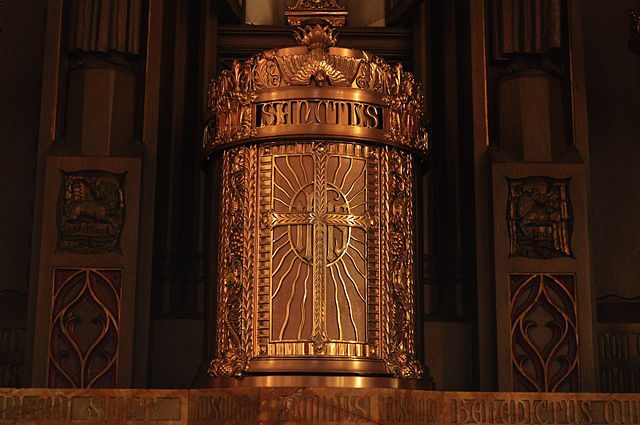
Martin Luther: “a thing is not destroyed simply by being misused.”
Ex opere operato is the notion that the Eucharist, provided the proper words of consecration are uttered, is valid and real whether the priest celebrating the Mass is wicked or a perfect saint. This sort of error (the denial of the above) is what made the Donatists split off of the Catholic Church, as schismatics. St. Augustine opposed that vigorously, and Luther the Augustinian, follows his (and the Catholic Church’s) belief.
I . . . found the page in which you ask about the power of the words of institution in the sacrament. You think rightly that the power comes from the promise if, between ourselves, there is any power in the words. But you know, too, that it is faith alone that consecrates, and the priests are very often without faith when they consecrate, in which case, of course, their use of the words is not only a mockery and deception, but is even impious. Therefore, in order to be safe, we ought to learn that they also consecrate, and although a priest ought not to be such an unbeliever, nevertheless he can consecrate in the faith of the Church when he acts by the command and authority of the Church. For it is not he that speaks the words, but the Church, and he is the minister of the words which the Church speaks. (Letter to Paul Speratus, 13 June 1522)
It has been told me that with you there are certain men of the new sort called “spiritual,” who deny that the sacrament of the body of Christ exists among the papists, but who falsely believe that they have nothing but mere bread. If you are able to accomplish anything with these men by my testimony, tell them to stop believing and teaching this. For a thing is not destroyed simply by being misused. Otherwise we should have to say that the Gospel did not exist when the impious hear it, and that the sun which the ungrateful see did not exist, and that God Himself, whom the impious worship perversely, was not God. For Christ did not build His foundation on our faith and virtue, but on His own word and power. He says it, and He does what He says, whether we believe or not. Wherefore admonish them to consider not the impious papists, but the true and powerful maker, Christ, who has willed and wills that His Word and sacrament should be one and the same to all men, whether pious or impious. (Letter to Lambert Hemertus, 12 June 1527)
***
(originally 11-12-14)
*
Photo credit: Tabernacle, Saint John’s Roman Catholic Church, Middletown, Connecticut. Photograph by Joe Mabel (7-24-13) [Wikimedia Commons / Creative Commons Attribution-Share Alike 2.0 Generic license]
***













